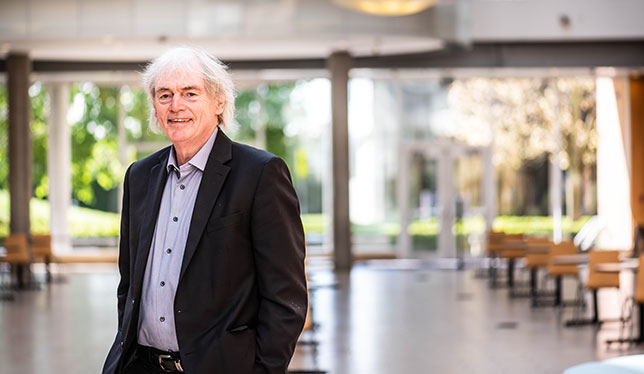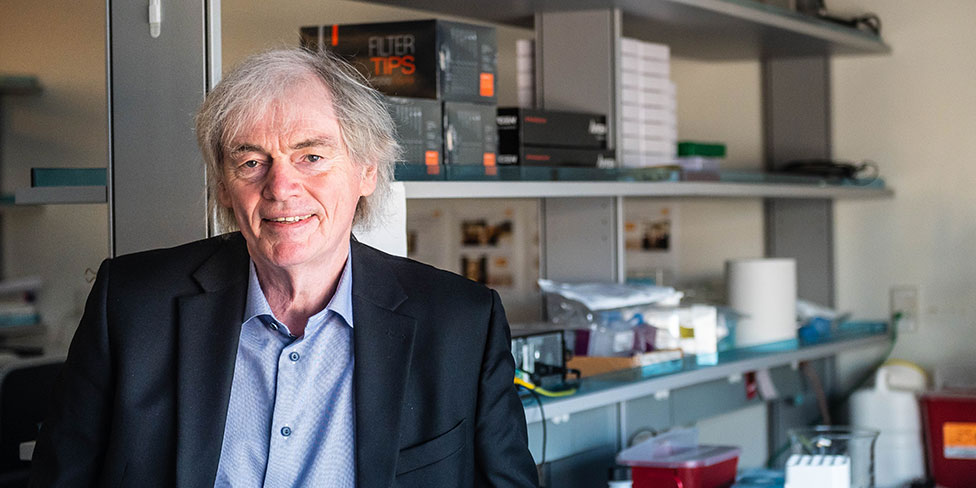When Pieter Cullis sat down to receive his first jab of the Pfizer-BioNTech vaccine for COVID-19 at a clinic on the University of British Columbia campus in March 2021, he mentioned to the attending nurse that he had “something to do with the genesis of this vaccine.”
But her reaction discouraged any further conversation. “She gave me a look like I came from outer space,” recalls Dr. Cullis. “I thought she was going to reply, ‘Yeah, and I’m married to Brad Pitt.’”
In fact, Dr. Cullis played a critical role in this vaccine saga. A key component was created by Acuitas Therapeutics, the Vancouver biotech company that the lean, long-haired, 75-year-old biochemist founded in 2009.
Every Pfizer-BioNTech or Moderna shot contains billions of sub-microscopic bubbles of fat known as lipid nanoparticles (LNPs). Each particle contains four lipids and a strand of the nucleic acid RNA, with the five pieces precisely assembled in such a way that it allows the RNA to enter our cells and stimulate the immune system to defend against COVID-19.
Acuitas Therapeutics specializes in the use of liquid nanoparticles for therapeutic medicine, and one of the company’s delivery systems was used to engineer the COVID-19 vaccine. “These liquid nanoparticles form a protective outer shell around the mRNA,” explains Dr. Cullis. “Without this delivery system, the mRNA would not be able to penetrate the cell and would not be able to make the protein that it codes for – in this case, the spike protein on the SARS-CoV-2 virus.”
The groundwork for this remarkable technology was laid over 40 years ago, when Dr. Cullis, together with some other UBC colleagues, began cultivating delivery systems for small molecule anti-cancer drugs used in chemotherapy. “In 1995, we began trying to develop LNP systems that could deliver much bigger RNA and DNA molecules into cells,” notes Dr. Cullis. This pioneering research resulted in a method of delivering strands of nucleic acids that silence gene activity (this blocks the production of a mutated gene that, when active in the liver, is responsible for patients’ symptoms). One such treatment, patisiran, is now approved for a rare inherited disease.
“It is all a bit surreal to be involved with something as big as this. [It’s] really the product of the work of hundreds of people.”
In 2012, Cullis and his colleagues began investigating the use of the LNP delivery system in mRNA-based medicines. Working with mRNA presents a much tougher challenge. Not only are mRNA molecules larger, they are also far less stable and potentially toxic. Other scientists had been trying without success for years to find a method of safely and effectively delivering mRNA into human cells.
In 2014, Acuitas’ work on mRNA encapsulation caught the attention of Drew Weissman, an American immunologist from the University of Pennsylvania and his co-researcher Katalin Kariko, who is now an executive with the German research company BioNTech. Dr. Weissman and Dr. Kariko had deduced how to synthesize mRNA vaccines for human use but had failed to find a suitable delivery system. In animal experiments the mRNA was prone to falling apart, and triggered an inflammatory response, making the animals sicker.
Dr. Weissman asked Acuitas for help. “We packaged up some of his messenger RNA that was coding for a protein on a virus,” says Dr. Cullis, “and it worked brilliantly as a vaccine.”
This new alliance reaped unexpected dividends when SARS-CoV-2 sparked a global health emergency in January 2020. Acuitas and BioNTech (which partnered with Pfizer) quickly pivoted from creating vaccines for influenza to COVID-19. Because both are made of mRNA, they require similar LNPs. Still, it took weeks of diligent work to create an LNP specifically tailored to the COVID-19 vaccine.
When clinical trials involving 43,000 volunteers ended and Pfizer released results in November 2020 indicating the vaccine’s amazing efficacy, Dr. Cullis was stunned. “You hope for maybe 70 per cent effectiveness, but to hear 95 per cent, that is truly spectacular.”
In recognition of their critical role in the development of the mRNA engineering used in the COVID-19 vaccine, Dr. Cullis, Dr. Weissman and Dr. Kariko have received several international awards, including the 2022 Canada Gairdner International Award, a prestigious scientific honour that is traditionally considered a precursor to winning the Nobel Prize in Medicine.

“It is all a bit surreal to be involved with something as big as this,” admits Dr. Cullis, who stresses that the development of the COVID-19 vaccine is “really the product of the work of hundreds of people.”
For Dr. Cullis, the recent recognition he has received is the crowning achievement on a star-studded career that has seen him invent more than 40 patents, author more than 300 research papers, and found a dozen companies, creating an elite community of scientists that have made Vancouver a hotbed of lipid chemistry.
He believes that the breakthrough achieved with the COVID-19 vaccines provides a glimpse of the powerful impact that gene-therapy medicine will have on society.
“Within 10 years, about 40 per cent of all the new medicines will be this type of medicine – a nanoparticle containing mRNA. It allows you to go at these diseases in a very direct way,” Dr. Cullis says. “You’re going to see a universal flu vaccine, and probably within five years a very effective vaccine against HIV. Then you have malaria, Zika virus, rabies and many other viruses that we will have effective vaccines for using the mRNA approach. There may even be potential treatments for Parkinson’s and Alzheimer’s. It’s a revolution in medicine.”
